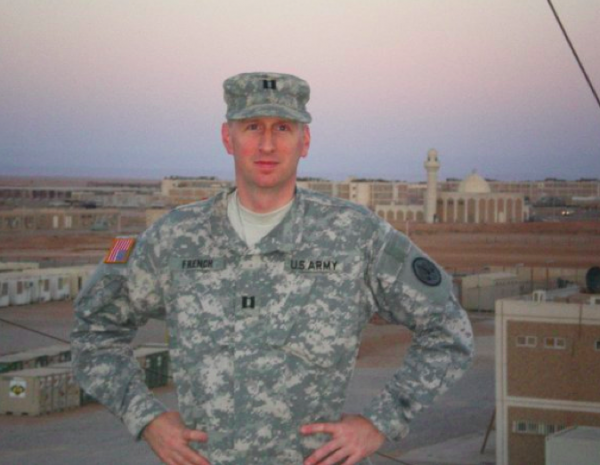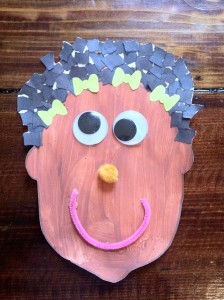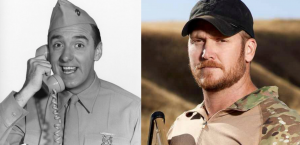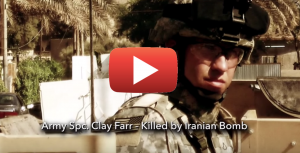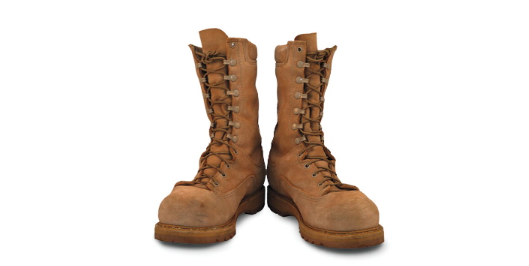My husband went to Iraq in 2007, a year when Veteran’s Day fell on a Sunday.
This might seem strange to you, but it never dawned on me that my husband — my attorney husband who joined the Army Reserves after 9/11 — could be called a “vet.” I mean, he’d been gone just a couple of weeks. Though I was pretty far from my high school Latin class, I knew that the word came from vetus, meaning “old.” A vet, to me, was a person who has had long service in the military, an old guy who seems to stand more erect than anyone else when the National Anthem is played before the high school basketball game.
When I was getting the kids ready for church that Sunday, I didn’t realize Veteran’s Day would affect me. In fact, as I struggled to get everyone ready for Sunday School, I wasn’t thinking about what day it was on the calendar.
However, I walked into Zion Presbyterian Church in Columbia, Tennessee holding the kids’ hands and realized that it was going to be even a tougher church service than normal.
Church was hard anyway. Something about walking into the old little building caused my social skills to simply disappear. Even casual greetings at church immobilized me. I detested the automatic responses which fall from everyone’s mouths — as if “How are you” is a quarter in the Presbyterian vending machine and “fine” is the conversational candy, all dusty and stale. It doesn’t matter if the dog died, the rent check bounced, or the in-laws are staying an extra week, it seemed the only appropriate response was “fine.” And, frankly, I wasn’t.
However, since I could tell the conversations would go no deeper than lyrics to a Lady Gaga ballad, I lied.
“Fine, thanks.”
Far worse than casual greetings, however, were the sincere ones. Church members with furrowed brows and low tones of voice, who asked — really, they emphasized — how things were. “Is David in a dangerous place?”
Later, their well-intentioned but overheard questions would reemerge in my children’s dreams. Consequently, “how are you” led to deception either way… whether I answered a reassuring “fine” because the person wanted to hear it or because the kids needed to. I skipped church, but my plan backfired. Within hours, the phone rang off the hook, and I could tell my church friends half-expected to talk me down from a ledge.
“How are you?”
When I worked with youth at a rural Pentecostal church many years ago, we had a “Soul Repo Van” — a dilapidated vehicle we drove to retrieve church-skipping, troubled, teenagers. We showed up on doorsteps of trailers and dragged their hides to church, whether their hides wanted saving or not. A real sense of urgency propelled us — Satan wouldn’t keep our friends from the balm in Gilead. But Presbyterians don’t operate that way — if we skip church, people assume it has less to do with Satan than golf at the country club. Nevertheless, my church-skipping raised eyebrows, because the church vowed to keep an eye on our family in David’s absence.
The next week, I put on my best dress and steeled my nerves. After all, if David could survive a year Iraq, I could survive a Sunday at Zion Presbyterian Church.
“How’re ya doing?” a man asked me as soon as I walked in.
“Awful.”
He smiled and kindly left me alone.
On Veteran’s Day, I sat in front of the congregation in the choir loft and winked at my kids sitting on the hard, wooden pew several feet away… alone. A conspicuously vacant space beside them testified to how their little lives had changed too. However, a kind, no-nonsense lady reached over and gently pulled my son up when he wasn’t standing for the Scripture reading, just as David would’ve done had he been there.
Something about the service weakened my composure. Maybe it was how the pastor explained to the kids in the “mini-sermon” we don’t worship the flag, but it represents values that enable us to worship God. Maybe it was the Revolutionary soldiers graves I passed as I entered the sanctuary, or the tired eyes of the WWII veterans who sat in the pews. But as the choir sang, “Fairest Lord Jesus,” my lips quivered.
I tried with every syllable to steady my voice, but one lyric pierced my soul.
“He makes the woeful heart to sing.”
I didn’t cry in the elegant way a leading lady might as she dabs her delicate tears with a starched linen handkerchief, but in the mildly disturbing way Tammy Faye might’ve had someone stole her mascara.
Soon, many congregants were crying too, the first sign of emotion since a visitor said “amen” in the summer of ’97.
In the media, church-goers are frequently portrayed as hypocritical, self-righteous rubes. But as a military spouse on that Veteran’s Day, I was actually quite grateful for the church — for the busy-bodies who called when I missed sermons, for the woman who wouldn’t let my 6 year-old be disrespectful, for my jogging buddy who wouldn’t let me cancel our workout (“it’s only sprinkling!”), for my Small Group Leader who fixed my garage door, for the deacons who promised David they’d bug the daylights out of me until he returned… I mean, to prayerfully watch out for me in his absence.
In one of my brief conversations with David, I complained church friends wouldn’t let me wallow in my sadness. “Christians are the worst people in the world,” he said, as both a good Presbyterian and a fan of Winston Churchill. “Except for everyone else.”
And he’s right. Friendships come and go, money’s made and lost, therapists hired and fired. But one thing will never change — in a time of need, a lady from church will show up uninvited on the doorstep with a casserole dish with her name written on the bottom. She’ll smile and say the soothing words every soul needs to hear: “Preheat the oven to 350 degrees and bake until it’s brown on top.” But before she leaves, she’ll add, “Just bring the dish back… at church on Sunday.”
That’s just how they operate.
After several months, I finally adjusted to David being gone, the kids celebrated their birthdays without him, and we frequently sent letters detailing the day’s complaints and joys. And, yes, we attended church. There, someone invariably asked me how I was doing.
“Fine,” I said, like everyone else.But, because of the church, it somehow managed to be true.

